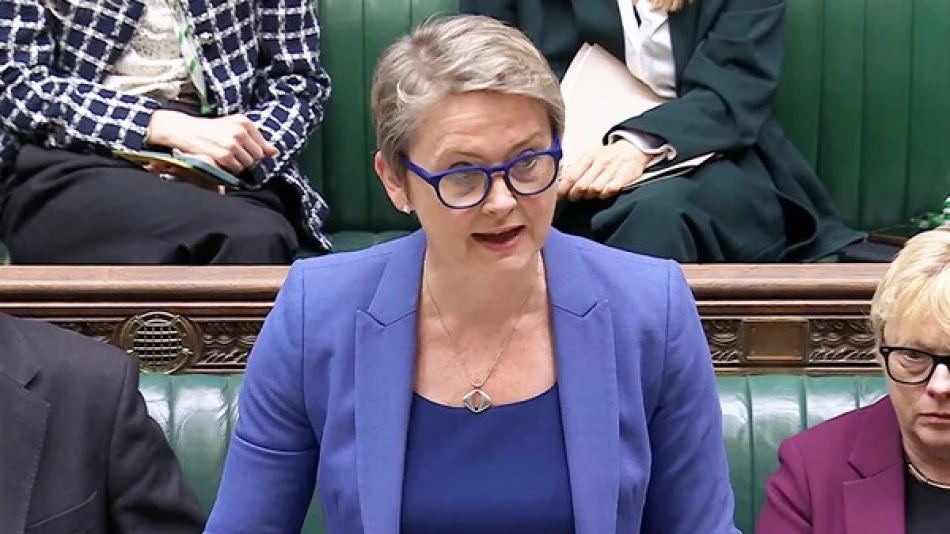
UK Temporarily Pauses Family Reunification for Refugees, Citing Capacity Constraints
UK Suspends Family Reunification for Refugees as Immigration Crisis Deepens
The United Kingdom has temporarily halted new family reunification applications for refugees already on British soil, marking a significant tightening of asylum policy as the Labour government grapples with record-breaking migration numbers. The move affects one of the few remaining legal pathways for refugees to bring spouses and children to safety, potentially forcing more desperate families into the hands of criminal smuggling networks.
Policy Shift Reflects Growing Political Pressure
Home Secretary Yvette Cooper announced the suspension to Parliament, citing immediate pressures on local authorities and risks posed by criminal gangs exploiting family reunification routes. The decision comes as the UK faces unprecedented asylum applications—over 111,000 between June 2024 and June 2025, the highest figure since records began in 2001.
Cooper promised reforms to the family reunification system before year-end, but offered no timeline for resuming new applications. The temporary freeze affects families seeking to join the 21,000 individuals who received reunification visas in the past year, predominantly women and children fleeing conflict zones.
Channel Crossings Surge Under Labour Leadership
Since Keir Starmer became Prime Minister in July 2024, more than 50,000 migrants have crossed the English Channel in small boats—a stark reminder that Labour's promise to "smash the gangs" has yet to materialize into reduced arrivals. The surge has intensified political pressure on a government that campaigned on competent migration management.
New Deal with France: A Risky Gamble
The UK is banking on a controversial August agreement with France that allows Britain to return small boat arrivals in exchange for accepting equivalent numbers through official channels. Cooper indicated the first returns would begin "later this month," with the first group already detained at Dover under the new protocol.
This quid pro quo arrangement mirrors similar deals attempted across Europe, though success rates remain mixed. Italy's agreements with Libya and Tunisia have reduced arrivals but raised human rights concerns, while the EU-Turkey deal of 2016 achieved temporary reductions before eventually breaking down under political strain.
Market and Economic Implications
The suspension signals a harder line that could reshape Britain's labor market dynamics. Family reunification has historically provided a controlled influx of workers, particularly in care sectors where refugee communities often find employment. Disrupting these pathways may exacerbate existing labor shortages while potentially increasing irregular migration costs.
Local authorities, already strained by housing and integration costs, may see temporary financial relief. However, the policy risks creating a larger undocumented population as families pursue dangerous alternatives to legal reunification.
Humanitarian Groups Sound Alarm
The British Refugee Council warns the suspension could backfire spectacularly, pushing "more desperate people to turn to smugglers." Chief Executive Enver Solomon emphasized that family reunification represented "one of the only safe and legal routes for refugees fleeing war and persecution to bring their wives and children."
This concern reflects broader European trends where restricting legal pathways has consistently failed to reduce overall migration while increasing dangerous crossings. Germany's experience during the 2015 migration crisis demonstrated that closing family reunification routes often leads to higher irregular arrivals, not lower overall numbers.
Strategic Miscalculation or Necessary Pause?
The timing suggests Labour is prioritizing short-term political relief over long-term migration strategy. With local elections approaching and Reform UK gaining ground on immigration issues, the suspension appears designed to demonstrate control rather than solve underlying problems.
However, the policy may prove counterproductive. By removing legal alternatives while maintaining the fundamental drivers of migration—conflict, persecution, and family separation—the UK risks increasing both irregular arrivals and human trafficking revenues. The government's success will ultimately depend on whether promised reforms create more efficient processing rather than simply more barriers to legitimate claims.
Most Viewed News

 Layla Al Mansoori
Layla Al Mansoori






